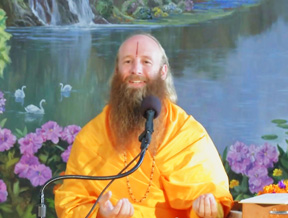 In the previous article of this series (To fight or not to fight: A moral dilemma), Swami Nikhilanand Ji had explained in gist what the Gita is, what its origins are, and how we can have confidence that the Gita available today is an authentic account of the conversation that took place between Krishna and Arjun on the battlefield of Kurukchetra more than 5,000 years ago. Now that we understand the basics, let us know from Swamiji if there is a certain qualification for receiving the knowledge of the Gita.
In the previous article of this series (To fight or not to fight: A moral dilemma), Swami Nikhilanand Ji had explained in gist what the Gita is, what its origins are, and how we can have confidence that the Gita available today is an authentic account of the conversation that took place between Krishna and Arjun on the battlefield of Kurukchetra more than 5,000 years ago. Now that we understand the basics, let us know from Swamiji if there is a certain qualification for receiving the knowledge of the Gita.
Q: Is there a right way to acquire knowledge about the Bhagwad Gita?
Every knowledge has restrictions with regard to who can learn it. This is as true in material matters as it is in spiritual matters. Before beginning a Masters degree, one must have completed his undergraduate degree in that subject.
Otherwise, he will not grasp the knowledge being given by his professor at the post-graduate level, and instead of progressing in his understanding, he will only become more confused.
The spiritual knowledge given by the various Hindu scriptures is also of different levels, from beginner to advanced.
This is why every Hindu scripture has a specific qualification that must be met before someone can study it or learn it correctly. If an unqualified person attempts to study any scripture, then, instead of gaining clarity about the philosophy of Sanatan Dharma, he will only become more confused.
Further, some types of knowledge can even be harmful to an unqualified person. For example, if someone learns that aspirin cures headaches, but doesn’t know what the proper dosage is, he may swallow the whole bottle, assuming that if one is good, then more must be better. In other words, knowledge partially or incorrectly understood can be more harmful than no knowledge at all.
In spiritual matters as well, if the teaching of a particular scripture isn’t precisely and fully understood, it may be misinterpreted, and instead of helping a person on his spiritual path, his wrong understanding becomes an obstacle. This is why we must pay heed to the statements of each scripture telling what the qualifications are to study it.
Q: Are there any prerequisites to learning the Gita? If so, what are they?
The qualification to learn the Gita is as follows: in chapter 18, verse 67, the Gita says that one who does not have faith in Shree Krishna should not hear the Gita. When translating this shlok, Jagadguru Shankaracharya said this means if a person does not have faith that Krishna is bhagwan, he is not qualified to listen to or read the Gita.
Did Arjun have faith that Shree Krishna is God? Certainly he did. Otherwise, when given the choice, why would he have chosen a weaponless Shree Krishna over His entire army? When both Arjun and Duryodhan went to Dwarika to ask Shree Krishna’s help in the war, He gave them a choice: one could have Him on their side, but with the condition that He would not lift a weapon for the whole war; and one could have His entire army, consisting of (number of divisions, etc.). Arjun was given the first choice, and he chose Krishna over His army. Who in his right mind would make such a decision, unless he believed that Krishna was God?
Why did Shree Krishna reveal the Gita to Arjun, and not to Duryodhan?
The simple answer to this question is that even God cannot instill faith in an unfaithful person. When Duryodhan learnt that Arjun had picked Lord Krishna, and not his massive army, Duryodhan was very relieved and thought that Arjun was extremely foolish to have not chosen His army. In other words, he had no faith in Shree Krishna. Later, when Krishna went to Duryodhan as a messenger of peace in order to avert the war, Duryodhan would not heed His advice.
He insulted Krishna and tried to have Him imprisoned. Krishna even revealed His Divine almighty form before Duryodhan in an effort to influence him, but even then he did not accept Krishna’s Divinity. It is amazing to think that even if God Himself comes to a person, if that person is not humble and faithful, then even God cannot help him. Then is it any wonder that Krishna chose to reveal the Gita to Arjun, instead of Duryodhan? A person must be humble to be open to the spiritual teachings, and faithful to accept them.
Thus, we see that an unfaithful person, no matter how learned or intelligent he is, is unqualified to receive the teachings of the Gita. There is one more important qualification to learn the Gita, which I will cover in the next part of this series.
Disciple of Shree Kripaluji Maharaj:
Swami Nikhilanand Ji is a Canadian born Hindu spiritual leader based in Austin, Texas. He is a sanyasi disciple and pracharak of Jagadguru Shree Kripaluji Maharaj.
Attracted to the teachings of Hinduism from a young age, Swamiji eventually let his deep spiritual longing lead him to India, where he was most fortunate to come under the guidance of Shree Kripaluji Maharaj. Thereafter, living in the ashrams of JKP, he extensively studied Hindi, the philosophy of the prime Sanskrit scriptures (Vedas, Darshan Shastras, Gita, Bhagwatam), and practiced meditation in the tradition of raganuga bhakti. In 2003, he was given sanyas.
Now, with the blessings of his Guruji, he offers satsang programs throughout America, engaging audiences with his clear explanations of Hindu philosophy coupled with inspired chanting of Sanskrit mantras and shlokas and charming nam sankirtan. His informative and compelling speeches provide practical insight into how to adopt the teachings of Sanatan Dharm into our daily lives, and inspire us to awaken our inner spiritual potential.
To stay in touch with Swami Nikhilanand Ji, like his Facebook page at https://www.facebook.com/SwamiNikhilanand or follow him on twitter at https://twitter.com/Swami_Nikhil.






